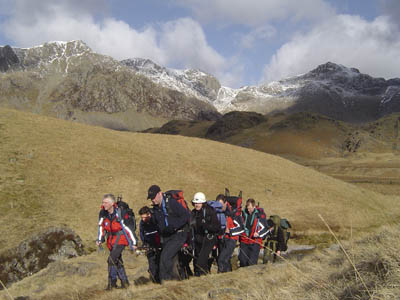
Mountain rescuers at work
Government agency Ofcom has responded to the barrage of criticism of its plans for mountain rescue team radio by issuing an update on its proposals.
The radio watchdog claims it has no plans to charge search-and-rescue teams for using their equipment and that the Royal National Lifeboat Institution, the charity which runs the country’s lifeboats, may actually end up paying less.
A note issued by Ofcom yesterday said: “There has been widespread interest in these proposals, and concern has been expressed about possible impact on charities providing vital safety of life services, such as the RNLI.
“Ofcom is committed to ensuring that the use of spectrum by these charities is fully protected, and to supporting their work.
“Most radio channels used by search-and-rescue teams are assigned to, and paid for by, the Maritime and Coastguard Agency, which is an executive agency of the Department for Transport funded by general taxation.
“The fees which the MCA pays for these channels already reflect the value of the spectrum, rather than just the administrative cost of processing licences. So there is unlikely to be any significant increase, if any, in what the MCA pays for these search and rescue channels.
“Mountain rescue teams are covered by these arrangements with [the] MCA and do not pay any fees for the use of these channels. Ofcom has no plans to impose a charge on mountain rescue teams for the use of these channels.”
The statement fails to address one of the principal concerns of the rescue organisations: that any increase charged to the MCA may be passed on to the mountain rescue teams. Any extra cost, no matter how small, would have an impact on the teams which rely on public donations.
Ofcom has also not answered the question of the potential effect on rescue operations if parts of the radio spectrum currently used by teams are given to commercial organisations.
Mountain Rescue England and Wales, which represents the rescue teams south of the border, wants a commitment that they will not be saddled with increased costs at some point in the future. As Dave Allen, the MREW chairman said: “We really need to be permanently exempt from these charges and for the frequencies allocated to us to be left alone.”
The fact that Ofcom has felt the need to issue a statement before the end of its consultation on 20 October will be seen by many as evidence that the concerted campaign is having an effect.
The Ofcom update can be seen on its website.